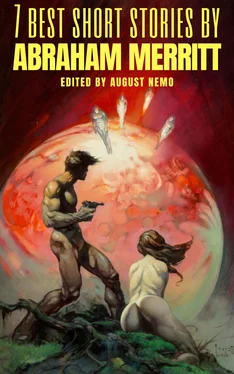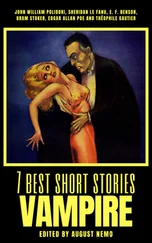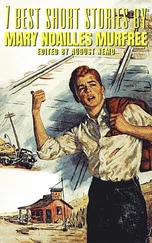At the feet of the pines crouched laurels and dwarfed rhododendrons of a singular regularity of shape and of one height, that of a kneeling man. Their stiff and glossy leaves were like links on coats-of-mail... like the jade- lacquered scale-armor of the Green Archers of Kwanyin who guard the goddess when she goes forth in the Spring to awaken the trees. The pines were like watchful sentinels, and oddly like crouching archers were the laurels and the dwarfed rhododendrons, and they said as plainly as though with tongues: Up these steps you may go, and down them—but never try to pass through us!
A woman came round one of the bastions. She walked stubbornly, head down, as one who fights against a strong wind—or as one whose will rides, lashing the reluctant body on. One white shoulder and breast were bare, and on the shoulder was a bruise and blood, four scarlet streaks above the purpled patch as though a long-nailed hand had struck viciously, clawing. And as she walked she wept.
The steps began to lift. The woman raised her head and saw how steeply here they climbed. She stopped, her hands making little fluttering helpless motions.
She turned, listening. She seemed to listen not with ears alone but with every tensed muscle, her entire body one rapt chord of listening through which swept swift arpeggios of terror. The brittle twilight of the Yunnan highlands, like clearest crystal made impalpable, fell upon brown hair shot with gleams of dull copper, upon a face lovely even in its dazed horror. Her grey eyes stared down the steps, and it was as though they, too, were listening rather than seeing...
She was heavy with child...
She heard voices beyond the bend of the bastion, voices guttural and sing- song, angry and arguing, protesting and urging. She heard the shuffle of many feet, hesitating, halting, but coming inexorably on. Voices and feet of the hung-hutzes, the outlaws who had slaughtered her husband and Kenwood and their bearers a scant hour ago, and who but for Kenwood would now have her. They had found her trail.
She wanted to die; desperately Jean Meredith wanted to die; her faith taught her that then she would rejoin that scholarly, gentle lover-husband of hers whom she had loved so dearly although his years had been twice her own. It would not matter did they kill her quickly, but she knew they would not do that. And she could not endure even the thought of what must befall her through them before death came. Nor had she weapon to kill herself. And there was that other life budding beneath her heart.
But stronger than desire for death, stronger than fear of torment, stronger than the claim of the unborn was something deep within her that cried for vengeance. Not vengeance against the hung-hutzes—they were only a pack of wild beasts doing what was their nature to do. This cry was for vengeance against those who had loosed them, directed them. For this she knew had been done, although how she knew it she could not yet tell. It was not accident, no chance encounter that swift slaughter. She was sure of that.
It was like a pulse, that cry for vengeance; a pulse whose rhythm grew, deadening grief and terror, beating strength back into her. It was like a bitter spring welling up around her soul. When its dark waters had risen far enough they would touch her lips and she would drink of them... and then knowledge would come to her... she would know who had planned this evil thing, and why. But she must have time—time to drink of the waters —time to learn and avenge. She must live... for vengeance...
Vengeance is mine, saith the Lord!
It was as though a voice had whispered the old text in her ear. She struck her breast with clenched hands; she looked with eyes grown hard and tearless up to the tranquil sky; she answered the voice:
"A lie! Like all the lies I have been taught of—You! I am through with—You! Vengeance! Whoever gives me vengeance shall be my God!"
The voices and the feet were nearer. Strange, how slowly, how reluctantly they advanced. It was as though they were afraid. She studied the woods beyond the pines. Impenetrable; or if not, then impossible for her. They would soon find her if she tried to hide there. She must go on—up the steps. At their end might be some hiding place... perhaps sanctuary...
Yes, she was sure the hung-hutzes feared the steps... they came so slowly, so haltingly... arguing, protesting...
She had seen another turn at the top of this steep. If she could reach it before they saw her, it might be that they would follow her no further. She turned to climb...
A fox stood upon the steps a dozen feet above her, watching her, barring her way. It was a female fox, a vixen. Its coat was all silken russet-red. It had a curiously broad head and slanted green eyes. On its head was a mark, silver white and shaped like the flame of a candle wavering in the wind.
The fox was lithe and graceful, Jean Meredith thought, as a dainty woman. A mad idea came, born of her despair and her denial of that God whom she had been taught from childhood to worship as all-good, all-wise, all-powerful. She thrust her hands out to the fox. She cried to it:
"Sister—you are a woman! Lead me to safety that I may have vengeance—sister!"
Remember, she had just seen her husband die under the knives of the hung- hutzes and she was with child... and who can know upon what fantastic paths of unreality a mind so beset may stray.
As though it had understood the fox paced slowly down the steps. And again she thought how like a graceful woman it was. It paused a little beyond reach of her hand, studying her with those slanted green eyes—eyes clear and brilliant as jewels, sea-green, and like no eyes she had ever seen in any animal. There seemed faint mockery in their gaze, a delicate malice, but as they rested upon her bruised shoulder and dropped to her swollen girdle, she could have sworn that there was human comprehension in them, and pity. She whispered:
"Sister—help me!"
There was a sudden outburst of the guttural singsong. They were close now, her pursuers, close to the bend of the steps round which she had come. Soon they must turn it and see her. She stood staring at the fox expectantly... hoping she knew not what.
The fox slipped by her, seemed to melt in the crouching bushes. It vanished.
Black despair, the despair of a child who finds itself abandoned to wild beasts by one it has trusted, closed in on Jean Meredith. What she had hoped for, what she had expected of help, was vague, unformulated. A miracle by alien gods, now she had renounced her own? Or had her appeal to the vixen deeper impulse? Atavistic awakenings, anthropomorphic, going back to that immemorial past when men first thought of animals and birds as creatures with souls like theirs, but closer to Nature's spirit; given by that spirit a wisdom greater than human, and more than human powers—servants and messengers of potent deities and little less than gods themselves.
Nor has it been so long ago that St. Francis of Assisi spoke to the beasts and birds as he did to men and women, naming them Brother Wolf and Brother Eagle. And did not St. Conan baptize the seals of the Orkneys as he did the pagan men? The past and all that men have thought in the past is born anew within us all. And sometimes strange doors open within our minds—and out of them or into them strange spirits come or go. And whether real or unreal, who can say?
The fox seemed to understand—had seemed to promise— something. And it had abandoned her, fled away! Sobbing, she turned to climb the steps.
Too late! The hung-hutzes had rounded the bend.
There was a howling chorus. With obscene gestures, yapping threats, they ran toward her. Ahead of the pack was the pock-faced, half-breed Tibetan leader whose knife had been the first to cut her husband down. She watched them come, helpless to move, unable even to close her eyes. The pock-face saw and understood, gave quick command, and the pack slowed to a walk, gloating upon her agony, prolonging it.
Читать дальше

![Коллектив авторов - Best Short Stories [С англо-русским словарем]](/books/26635/kollektiv-avtorov-best-short-stories-s-anglo-thumb.webp)










